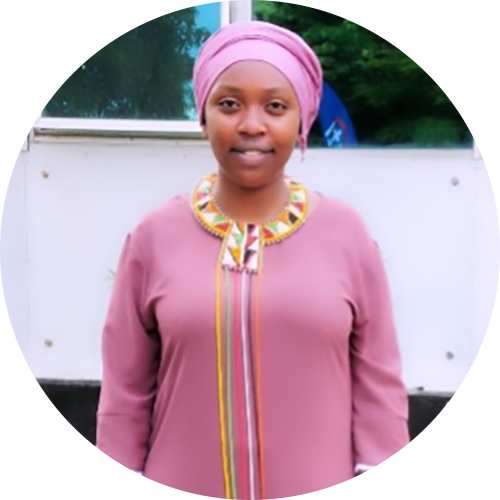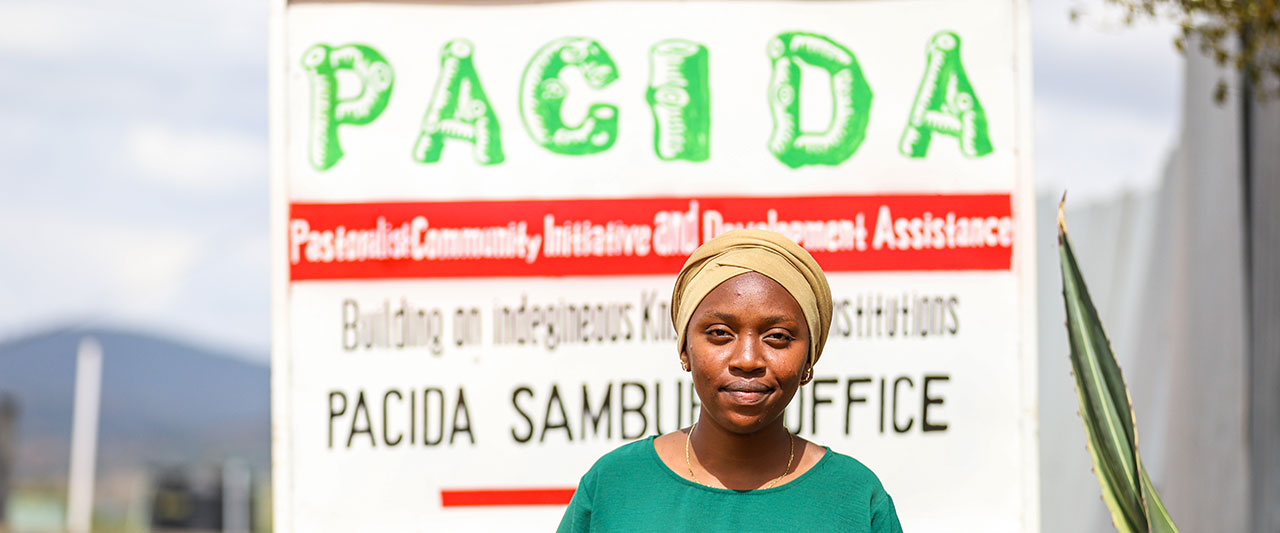With a grant from Ipas’s Collaborative Fund, Abdiah Lalaikipian’s organization was able to make meaningful changes in northern Kenya’s pastoralist communities. The Collaborative Fund approach involves designing by dialogue. Through a participatory process, we enable communities and Civil Society Organizations to design projects that best address their issues.
Learn more about our locally led, globally connected grantmaking program, the Ipas Collaborative Fund
Abdiah Lalaikipian hails from Samburu County, northern Kenya, home to the semi-nomadic Samburu people. Despite the community’s patriarchal norms, Lalakipan’s father prioritized education for his children.

“My parents believed education was key to improving our lives, regardless of gender. They ensured we attended the best schools within their means,” explains Lalaikipian, a program manager at Pastoralist Community Initiative and Development Assistance (PACIDA) in Samburu, which was a grantee of the Ipas Collaborative Fund in 2022. Ipas partnered with PACIDA to tackle the impacts of climate change on reproductive rights. The solutions—generated by the people most affected—are helping build resilient communities. In her current role, Lalaikipian supports pastoralist communities by promoting sustainable livelihoods and natural resource management. This involves educating communities on climate-smart agriculture and empowering them to assert their environmental rights.
Lalaikipian recently shared insights with Ipas about her life and work, shedding light on the intersection between climate change and sexual and reproductive health and rights and the impact of the Ipas Collaborative Fund on PACIDA’s work and impact.
Ipas: As the program manager of PACIDA, what keeps you motivated?
Lalaikipian: The pastoralist communities in Kenya have long been marginalized, leaving them vulnerable to numerous challenges such as malnutrition, food insecurity, climate change, lack of education and access to health-care services. In my professional journey, I aimed not only to give back to my community but also to collaborate with them in developing sustainable solutions to address these issues because I’m motivated and inspired by the resilience of pastoralist communities.
In my role at PACIDA, over the past three years, I’ve been involved in delivering timely emergency responses to pastoralist communities. Additionally, I’ve worked on initiatives to enhance their resilience to climate change, advocating for policies and budgets supporting health, climate adaptation and education programs.
As someone who grew up in both a pastoralist community and an urban setting, what impacts of climate change have you witnessed?
Growing up, when we went back to the village for holidays, we were frequently told stories on the drought patterns from time immemorial by older generations; mostly, it was experienced every three years like clockwork. To cope, communities proactively relocate their animals to higher grounds, sometimes even crossing into neighboring countries, i.e. Ethiopia, for pasture and water for their animals. Climate shocks have altered this predictability as weather patterns have become erratic. Women, especially, bear the brunt as they juggle household duties with gathering firewood and fetching water. Consequently, essential services like health care, including sexual health products, often take a backseat. Thanks to the Collaborative Fund grant, we adapted our programs to address this shifting reality. Climate change conversations became a focal point for initiating discussions on sexual and reproductive health and rights (SRHR).
Climate change conversations became a focal point for initiating discussions on sexual and reproductive health and rights (SRHR).
Tell us more about how PACIDA used climate change training to initiate discussions on SRHR.
As an organization, our extensive work in climate change programming naturally paved the way for discussing sexual and reproductive health issues. This allowed us to build trust with communities, including recruiting entirely new groups we hadn’t previously engaged with directly.
Whereas our previous efforts focused on strengthening community resilience, we hadn’t directly engaged with women’s groups in terms of sharing SRHR information until now. Our climate change training, covering topics like climate-smart agriculture, was a crucial entry point. While empowering communities with climate change knowledge, we also introduced education on sexual health topics such as family planning and menstrual health. This approach facilitated smooth integration, as evidenced by ongoing engagement from the women’s groups. Their continued participation demonstrates a sustained interest in and commitment to SRHR discussions.
What are the longstanding barriers your community has faced in accessing SRHR information and services?
Accessing information on sexual and reproductive health and rights posed significant challenges. In a region where child marriages are prevalent, our knowledge was mainly limited to what older female relatives, like aunts, taught us, often simplifying it to ‘don’t get pregnant’ for unmarried girls. Even when SRHR services were available in clinics, our nomadic lifestyle led to irregular access, with some instances of family planning methods expiring due to our constant movement.
For instance, women might travel long distances, up to 45 or even 75 kilometers on foot, to reach a health center for services. Additionally, despite training, some women preferred delivering [a baby] at home when they moved, making it challenging to ensure safe deliveries. Community health volunteers struggled to trace individuals due to frequent relocations, making consistent health-care provision difficult.
Additionally, unsafe abortions are an unfortunate consequence of limited SRHR knowledge. While I haven’t witnessed such incidents firsthand, I’ve been a referral point for girls who have undergone botched abortions, often using traditional, unsafe methods such as stomping on the stomach.
What aspects of the project you ran with the Collaborative Fund grant felt most impactful to you?
The research assessment bit of the project, where we explored the connection between climate change and sexual reproductive health and rights, was very impactful. Understanding this connection was pivotal for implementing our intervention and advocacy initiatives in the county.
Observing pastoralist communities adopt climate-smart agriculture, fruit farming, and youth groups establishing tree nurseries as income-generating activities was equally impactful, especially considering their historical reliance on livestock as the primary source of livelihood.
How is the Collaborative Fund different from the types of funding you get from other donors?
The Collaborative Fund was truly transformative for us. Unlike other funds, it didn’t restrict us to specific themes, empowering us to tailor a proposal that addressed the pressing needs of our community at the time of application. During implementation, the lead agency, Ipas Africa Alliance, provided invaluable technical support and allowed us to leverage our existing systems, including reporting templates for financial and narrative reports. This flexibility was a departure from the usual donor funding requirements, where we’re often constrained to use donor-specific templates.
This funding opportunity not only enabled us to showcase our work but also supported ongoing advocacy efforts on regional and international platforms. As a result, our advocacy profile in the regional space has significantly improved, further amplifying our impact.
The Collaborative Fund was truly transformative for us. Unlike other funds, it didn’t restrict us to specific themes, empowering us to tailor a proposal that addressed the pressing needs of our community at the time of application.
What did you learn from the project or take away that you value?
Our communities have the ability to design solutions to address their issues, and programs for long-term sustainability. It is critical to work with them when designing and implementing programs.


